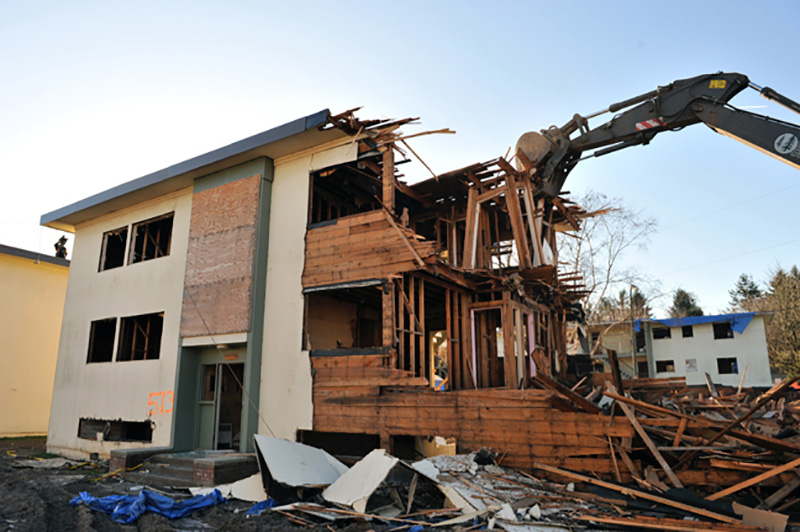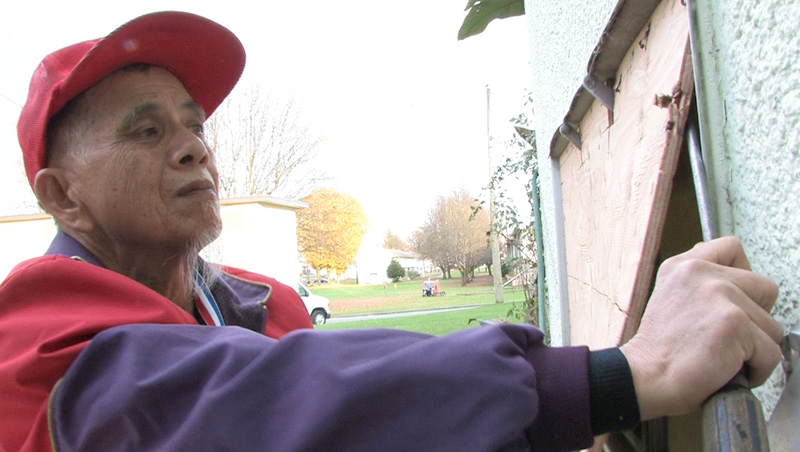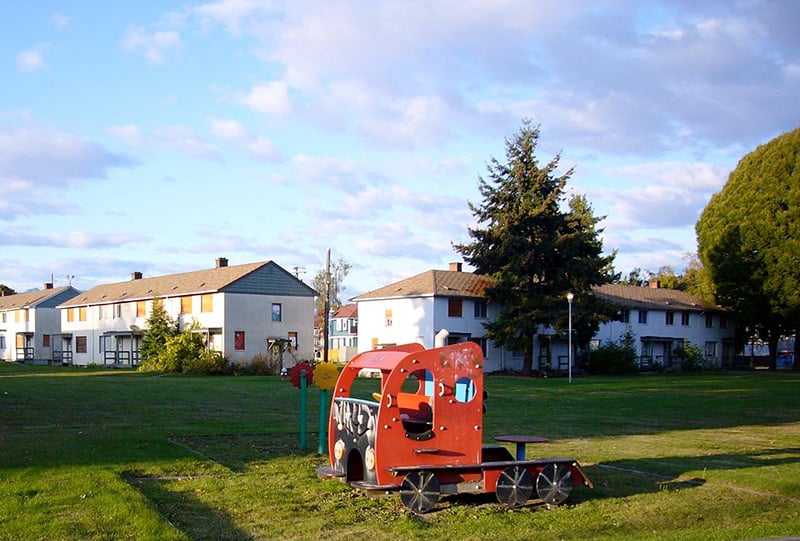Two weeks after Christy Clark was sworn in as B.C. premier in 2013, the new BC Liberal government signed an agreement confirming the developer of Vancouver’s Little Mountain property would get a five-year extension on its $211-million interest-free loan.
The Holborn Group of Companies had bought the publicly owned site in 2008 for $334 million, but paid just $35 million upfront. The province provided an interest-free loan of $211 million until 2021, and a low-interest loan of $88 million to construct social housing.
The agreement extended the interest-free loan to 2026, a benefit worth about $9.5 million to the developer based on provincial borrowing costs at the time.
Holborn, which won the bid to buy and develop the land in 2008, says it got the extension because a small number of public housing tenants refused to move out. The B.C. government was responsible for demolishing the housing before handing the site over to Holborn Group, it says.
But the current NDP government says the interest-free extension was part of the original agreement, signed in 2012.
“The Little Mountain sales agreement provided a clause that allowed for the interest-free period to be extended to Dec. 31, 2026, if construction of the non-market housing started prior to May 1, 2013,” said communications staff with the attorney general’s ministry, which currently holds the housing file.
The interest-free extension is just one more oddity in a long saga involving the sale of the Little Mountain public lands to a private developer that has critics calling for a public inquiry.
After a long legal battle, the Holborn Group of Companies released the original sales contracts last month, sparking an outcry over the details of the 2008 deal.
The contracts revealed that 14 years later, Holborn has still paid just $35 million of the $334-million purchase price.
And despite the financial breaks from taxpayers, only 53 replacement units of social housing have been built. Holborn says another 62-unit building is now underway, and construction on a daycare will start in 2022.
Michael Geller, a retired architect and real estate consultant who worked on a competing bid for the Little Mountain lands, said the deal is puzzling.
“It’s hard to fully understand why they offered such preferential terms — and I use that word carefully — but these are truly preferential business terms to this particular developer,” he said.
Little Mountain, located next to Queen Elizabeth Park in Vancouver’s Mount Pleasant neighbourhood, was the site of B.C.’s oldest public housing development. In 2007, the BC Liberal government told the tenants of the 224 homes that they would have to move.

The province’s plan was to sell the site to a private owner, which would replace the social housing and add more units of market housing and amenities like child care and a community centre. The developer would be required to build the social housing before it started building any condos or market rental.
The roughly $300 million in proceeds from the land sale was supposed to fund the construction of more social housing in Vancouver and throughout the province.
The situation has sparked protests, calls to take the site back into public ownership and criticism of the previous BC Liberal government for years.
But on Friday, B.C. Attorney General David Eby said there was no way to take back the land without having to pay hundreds of millions of dollars to Holborn.
He also rejected calls for a public inquiry into the deal, saying it would be too costly for taxpayers.
“This contract was a giveaway,” Eby said, repeating criticism he’s levied against the previous BC Liberal government.
Eby singled out former BC Liberal cabinet minister Rich Coleman, who has since left politics, as being to blame for the strange deal.
Coleman, the minister responsible for housing at the time, had embarked on a plan to sell publicly owned social housing sites to private and non-profit buyers. He did not respond to interview requests for this story.
Eby said he was able to put pressure on Holborn by making comments in the media, which led to meetings with company representatives in which they agreed to drop their court challenge to try to stop the sales contract from being made public.
The government has now signed a memorandum of understanding with the Holborn Group. The MOU says the 282 new social housing units promised in the 2008 agreement will now be completed by Dec. 31, 2024, and Holborn will meet every month with BC Housing and the City of Vancouver to make sure the project stays on track.
But like the contract Holborn signed with the province in 2008, the MOU has no teeth. Eby said he can only hope that Holborn will act in good faith.
David Chudnovsky was an NDP MLA in 2007, and Little Mountain was just a 15-minute walk away from his home. He first heard about the plan to sell the property when Little Mountain tenants started calling his constituency office, scared and stressed about possibly having to move.
Chudnovsky advocated on behalf of the tenants as an MLA. Later, as a private citizen, he fought to get the sales contract released to the public. He filed his freedom of information request in 2018, and said he was surprised at how long it took and how many ways Holborn could delay the process.
“I’m fighting a gigantic development company for some information. They hire Fasken Martineau, the largest legal firm in British Columbia, to work for them,” Chudnovsky said.
“And it’s just me with some people who helped out. The most that I’ve been able to spend on all of this is about $60 on xeroxing.”
Chudnovsky said he still has questions about the contract, and he’s continuing to call for a public inquiry. One of his questions is why the province extended the interest-free loan from 2021 to 2026.
Chudnovsky said he can only speculate that “it was an additional provision in the interest of the developer in exchange for doing what they said they were going to do from the beginning.”
The B.C. government says the intention was to incentivize the developer to meet a target of 2013 to start the first replacement social housing building.
“If development had not occurred, the extension may not have been granted by the BC Liberal government, although it is difficult to say,” communications staff from the attorney general’s ministry told The Tyee.
“This problematic contract is not one that would have been entered into by our government, and we are unable to exit this contract without incurring a liability of hundreds of millions of dollars in favour of the contractor.”
But Holborn has a different story. It says the refusal of a small group of tenants to leave threw the project timeline out of whack.
“Replacing the row-houses and relocating the tenants to other city sites was always the intention of Little Mountain’s redevelopment, and the original agreement stated that the site had to be clean, and free from encumbrances and any contamination prior to closing/transferring the title,” a Holborn representative said. “While this is a very common requirement in real estate transactions, the relocation of the tenants in the remaining row house caused delays in fulfilling the obligations of the agreement for all parties.”
After BC Housing initially tried to evict the tenants, but backed down after protests, Holborn says BC Housing and the City of Vancouver agreed to change the contract to allow the tenants who refused to leave to remain in their housing, but speed up construction of the first social housing building.
Holborn says under the agreement, it was allowed to start the 53-unit building, “under the site’s previous zoning rather than wait for the rezoning to be enacted.”

In the end, four families refused to leave, including an elderly couple, Sammy and Joan Chang, who were both blind. They were allowed to move into one of the remaining buildings on the site. Others were later housed in the new social housing building that Holborn completed in 2015, although Joan Chang died in 2014 and Sammy Chang soon after.
Chudnovsky said the decision to give Holborn the interest-free extension still doesn’t make sense.
Citing an information sheet that had been distributed to residents by BC Housing, Chudnovsky said residents were promised they would be able to move into their new homes by the summer of 2010.
“So, in return for starting the first of the buildings they had contracted to build five years previously, they got an additional five-year interest holiday,” Chudnovsky said.
Geller said the project is complicated, involving a large site that had to be rezoned by the City of Vancouver. It was difficult to know how much to bid on the site in 2007, Geller said, because it wasn’t clear how much density the city would allow on the land, which is located in a mostly single-family home neighbourhood.
Geller recalled that the team he worked on prepared two bids — one for a lower-density development, and one for higher density.
That rezoning was completed in 2016, and Holborn said, “the rezoning and permitting processes alone require significant consultation, clarifications and refinements before they are approved.”
The company also had to create “a brand-new policy statement” before the rezoning and permitting process could start, Holborn said.
But the complexity of the large project doesn’t explain the lack of progress, or why the province decided to extend the interest-free period, Geller said.
“The fact is, five years have passed since the rezoning application was approved at public hearing and three years have passed since the zoning was ‘enacted’ or finally approved,” he said. “There should have been more progress during this time period, if they really wanted to build the social housing and start the market housing.”
Holborn has built several condo projects in Metro Vancouver, as well as a Trump hotel and condo tower on West Georgia Street in downtown Vancouver. The hotel closed in August 2020.
Holborn also owns a single-room-occupancy hotel at 500 Dunsmuir St. which has been empty since 2013, as well as the Bay parkade on the same block. And the company hopes to develop a parking lot it owns at 95 W. Hastings St.
Holborn told the Vancouver Sun that while the $211-million loan would be unusual today, it was necessary in the wake of the 2008 financial crisis.
That doesn’t make sense to Geller either, who says there should be a public inquiry to determine how the deal happened.
“It was simply a terrible deal, negotiated by Rich Coleman... and aided and abetted by BC Housing and other government officials. It’s wrong to say, ‘Oh, it’s simply a reflection of the market at the time’ — that’s nonsense,” Geller said.
“The fact is some of the best developers in Vancouver were all interested in acquiring and developing this property. It’s not as if they didn’t get any bids and had to manufacture one.”
Chudnovsky still remembers Little Mountain as a close-knit community of people who lived in family-friendly townhouses — the type of housing that’s hard to find in Vancouver now, especially for people who make low to moderate incomes.
“It’s a story about a successful community that was destroyed — more than 700 people who were forced out of their homes. We should never forget that,” Chudnovsky said. “That’s the real story — those people in their homes and their community.” ![]()
Read more: BC Politics, Housing, Municipal Politics, Urban Planning + Architecture
















Tyee Commenting Guidelines
Comments that violate guidelines risk being deleted, and violations may result in a temporary or permanent user ban. Maintain the spirit of good conversation to stay in the discussion.
*Please note The Tyee is not a forum for spreading misinformation about COVID-19, denying its existence or minimizing its risk to public health.
Do:
Do not: